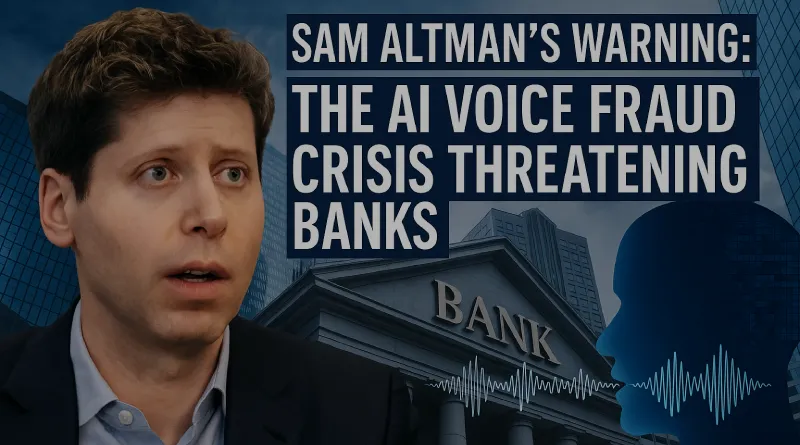Sam Altman’s Warning: The AI Voice Fraud Crisis Threatening Banks
At a Federal Reserve conference on July 22, 2025, OpenAI CEO Sam Altman issued a chilling warning to the financial industry: artificial intelligence (AI) has rendered voice authentication obsolete, paving the way for a “significant impending fraud crisis.” Speaking to representatives of major U.S. financial institutions, Altman highlighted the dangers of relying on voiceprints, a once-reliable security measure now vulnerable to AI-driven voice cloning. As AI technology advances, the potential for fraudsters to impersonate individuals and bypass bank security is growing, with implications that resonate globally, including in India’s rapidly digitizing financial sector. This article explores the AI voice fraud crisis, its impact, and actionable steps to stay safe, with a focus on India’s unique context.
The Vulnerability of Voice Authentication
The use of voice authentication, which grew popular more than ten years ago with high-net-worth clients in the banking sector, checks identity through the use of a passphrase that the customers are asked to speak on the phone. This system used to be secure because of the distinctive nature of human voices. Nevertheless, Altman cautioned that AI now can make voice clones that are so flawless that one cannot tell the difference between a voice recording made by a person and the voice recording made by AI, once analyzing only a few seconds of audio.
The weakness is not hypothetical. In 2024, the FBI reported that there are already scams that use AI voice cloning to target individuals where fraudsters prey on their loved ones by claiming they are in distress to get them to send money. An earlier example in early 2025 is where an artificially generated voice mimicked that of the U.S. Secretary of State Marco Rubio to defraud foreign government officials and a U.S. governor. Altman underlined that those banks that still employ voiceprints are mad to resort to them since AI has completely conquered this technique of authentication that puts the customers at great financial danger.
The payoffs are big. Financial fraud has been damaging the world economy to the extent that in 2024, a total of $485 billion was lost in this issue, as reported by the Association of Certified Fraud Examiners. Using AI voice cloning, fraud thematics find a way to circumvent security to move large amounts of financial resources, open unlawful accounts, or fraudulent loans, with victims only becoming aware when all is lost.
India’s Context: A Growing Target for AI Fraud
The boom in the online economy plus the existence of more than 800 million online users in India also makes it a target of AI fraud. The financial sector in the country has flown with the concept of digitalization, and the number of transactions through Unified Payments Interface (UPI) in 2025 will reach more than 15 billion per month. But these quick uptakes have led to laxity in cybersecurity aspects, in certain aspects. India The Indian Computer Emergency Response Team (CERT-In) reported a 35 percent increase in phishing and identity theft in India in 2024, with an estimate of up to 10 thousand million, or 100 billion rupees, or US$1.3 billion (as of September 2025) to the victims each year.
There are still a few Indian banks still using voice authentication, especially with premium clients and call center verifications. As an example, voice-based systems that are deployed by companies such as HDFC and ICICI to make high-value transactions are now under threat because of the availability of AI. Customers who are rural and semi-urban and mostly use phone banking as they do not have high access to the internet are particularly vulnerable to scammers who have taken advantage of voice cloning technology. In 2024, the Reserve Bank of India (RBI) made a report indicating that 60 percent of the complaints of banking fraud were reported in rural areas where the issue of digital literacy posed difficulties.
The latest example is the PAN 2.0 scam, which the Indian authorities recently alerted citizens about, reflecting how tricksters can take advantage of trust in the official system. Whereas that scam involved phishing messages, the introduction of AI voice cloning introduces an additional take to it, as the scammers are going to impersonate bank officials or loved ones during phone calls. This threat can be catastrophic in a country where 70% of the banking interactions are over the call centers, as per the survey conducted by RBI in 2024.
Unique Insights: Beyond Voice to Video Fraud
Altman cautions not only about voice cloning but also about the imminent risk of video fraud by AI. Today this is a voice call; tomorrow it is going to be a video or FaceTime that does not differ even a little bit with reality, he warned. This development has the potential to allow hackers to produce realistic deepfake footage, which would be used to deceive bank computers or bank workers into approving fund transfers. This presents a major risk in India, where video-based KYC (Know Your Customer) processes are becoming increasingly frequent when opening accounts. As an illustration, the 2023 regulations given by the RBI required video KYCs of particular transactions, although such systems have not yet been designed to identify AI-generated fakes.
One more thing is the delay in regulation. Although banks are being advised to implement AI-impossible authentication techniques, including two-factor authorization (MFA) that uses combinations of biometrics, passwords, and device checks, most institutions around the world and in India still use outdated products. Palo Alto Networks, a cybersecurity company, conducted a survey in 2025, and the result indicated that 80% of banking cybersecurity executives were afraid that AI would defeat their security measures and that only 30 percent of banks in India can certify that they have completed the adoption of MFA. Such a gap provides an opportunity to cheat.

Protecting Yourself: Practical Steps
To safeguard against AI voice fraud, individuals and banks must act proactively:
Banks should invest in AI-resistant technologies, such as behavioral biometrics that analyze typing patterns or device-specific authentication, as suggested by Fed Vice Chair Michelle Bowman during the conference.
The Road Ahead
The expression used by Altman is a sound of alarm bells to the financial sector of the world, as India is at a precarious stage. The RBI has done something in this regard, requiring banks to undertake cybersecurity audits in 2024, but efforts can still go further to address the threats posed by evolving AI. When tech companies such as OpenAI partner with financial regulators as suggested by Bowman, it may result in breakthrough innovations such as fraud detection systems based on AI.
In the case of the Indian consumers, vigilance remains important. The security must be kept strong by balancing out the convenience of voice authentication. Technically, as Altman observed, most of the means of people authentication in place nowadays have been beaten down by AI, except when it comes to passwords. India can curb the threats of this new wave of fraud by implementing MFA and ensuring awareness about the same.
Conclusion: A Call for Action
The dark message from Sam Altman concerning the voice fraud of AI necessitates banks to consider revamping the authentication mechanisms as an emergency. The stakes are even greater in India, where millions depend upon digital banking to survive. The financial industry can be ahead of fraudsters by implementing high-security levels, regulation, and consumer sensitization. At the moment, consumers need to be on watch, confirm every contact, and promote the therapy of larger protections. Artificial intelligence is currently advancing, and we also need to improve our defense such that, through technology, there is no possibility of rising fraud.
Disclaimer
The information presented in this blog is derived from publicly available sources for general use, including any cited references. While we strive to mention credible sources whenever possible, Web Techneeq – Web Design Agency in Mumbai does not guarantee the accuracy of the information provided in any way. This article is intended solely for general informational purposes. It should be understood that it does not constitute legal advice and does not aim to serve as such. If any individual(s) make decisions based on the information in this article without verifying the facts, we explicitly reject any liability that may arise as a result. We recommend that readers seek separate guidance regarding any specific information provided here.

